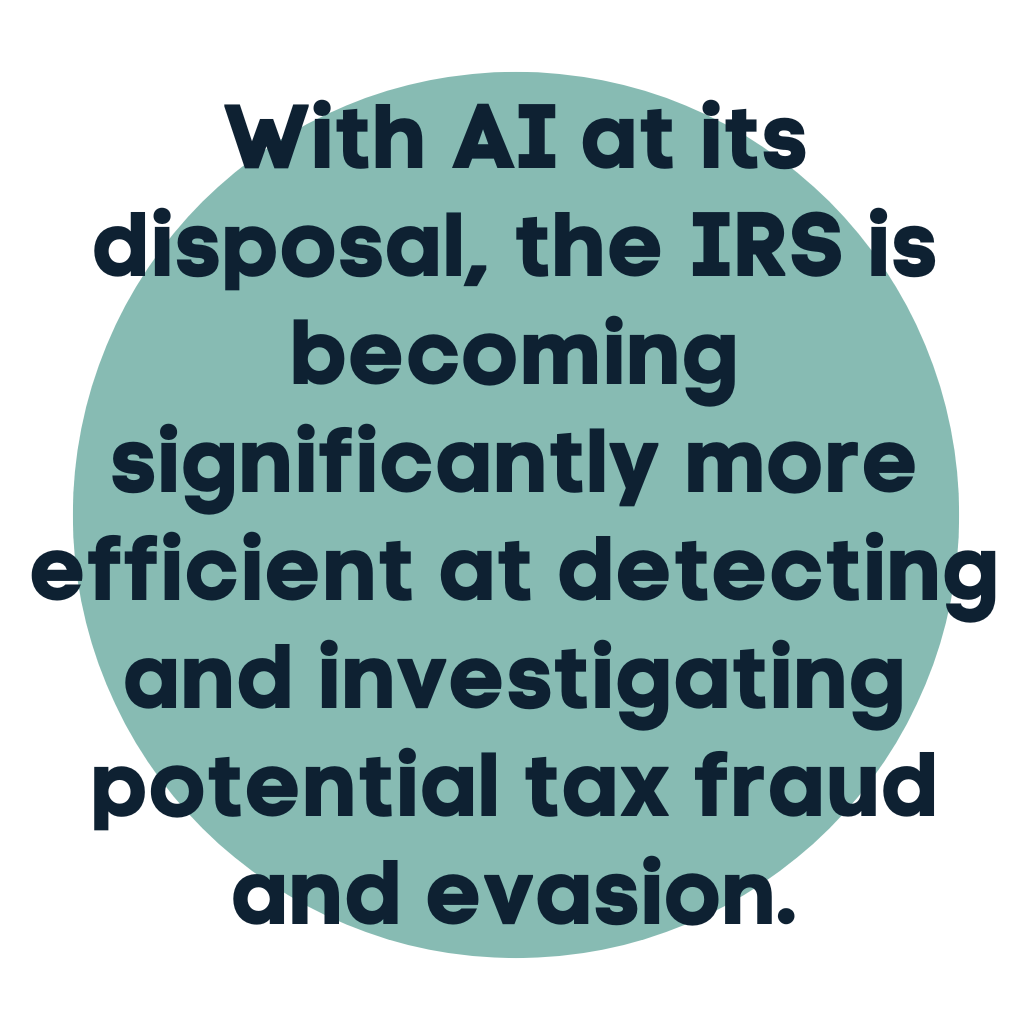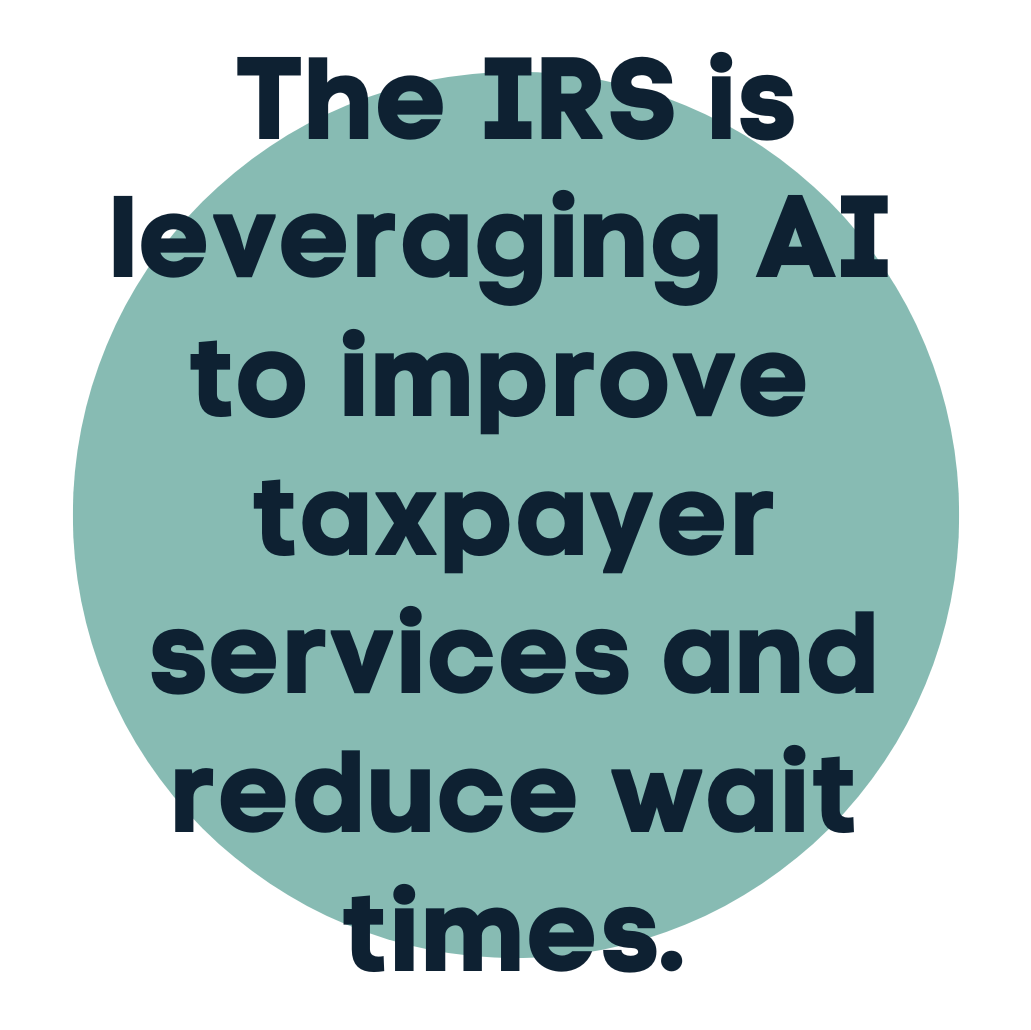
AI at the IRS: Catching Tax Cheats and Cutting Wait Times
The future of taxation is here, and it’s powered by artificial intelligence (AI).
Advanced machine learning algorithms and AI systems are capable of analyzing vast amounts of data.
Think beyond tax returns to bank reports, property records, and even social media posts. It’s a comprehensive system that can detect patterns and anomalies far more efficiently than traditional human analysis.
Imagine this: A U.S. taxpayer moves money from a European bank account to the Cayman Islands and then uses various ATMs to withdraw money to purchase a second home in Florida. AI systems can connect all these dots and create a package for IRS investigation.
You might care about this if…
- You’re concerned about taxpayers not paying their fair share.
- You might be skating on the wrong side of IRS law yourself.
- You’ve ever experienced the hour-long hold times and tear-your-hair-out frustration of trying to resolve an IRS error.
Let’s dig into just how much the IRS is using AI (at least how much they’ve shared!) and what that means for taxpayers.

Tax Compliance and Enforcement
With AI at its disposal, the IRS is becoming significantly more efficient at detecting and investigating potential tax fraud and evasion.
This technological leap is likely to lead to a higher number of audits, as the AI system flags more cases for review.
The shift from human-led reviews to AI-driven analysis represents a massive increase in the IRS’s capacity to scrutinize tax returns.
For example:
Identifying Industry Outliers: While a human auditor might have previously compared a handful of returns, AI can now analyze thousands or even millions of returns within the same industry or line of work. For instance, if you’re in the lawn care business, the IRS’s AI can now compare your return to a vast spectrum of taxpayers’ accounts in the same industry, making it much easier to identify outliers that have misreported their tax information.
This enhanced comparative ability builds upon the IRS’s long-standing use of Discriminant Function (DIF) scores to select returns for audit. The AI-driven approach takes this concept to a new level, allowing for more nuanced and comprehensive comparisons.
AI-Powered Income Matching: The IRS is leveraging AI for income matching, which is particularly evident in the issuance of CP-2000 notices.
These notices result from automated comparisons between what taxpayers report and what third parties report.
The system has become more advanced, and with increased reporting requirements, such as the expanded 1099-K reporting set to begin this year, the volume of data for AI analysis will grow substantially.
It’s important to note that while AI is revolutionizing certain aspects of IRS operations, not all areas are currently using these advanced algorithms.

However, the trend is clear: we’re seeing an increase in audits, especially on the business side, including S Corps, C Corps, and partnerships. As the IRS continues to build and refine its AI systems, we can expect this trend to expand across most types of returns.
The mere existence of such a powerful enforcement tool may encourage greater voluntary compliance among taxpayers who might otherwise be tempted to overreport expenses and deductions, underreport income, or engage in other forms of tax avoidance.
With AI’s ability to detect even subtle discrepancies, the risks of getting flagged for non-compliance (intentional or unintentional) have significantly increased.
Cutting Wait Times
While much attention is focused on AI’s role in tax enforcement, the IRS is also leveraging the technology to improve taxpayer services.
The agency has introduced AI-powered chatbots to answer basic questions and help taxpayers navigate the IRS website.
Enhanced automated phone systems using natural language processing are making it easier for taxpayers to get answers without long hold times.
IRS phone lines receive millions of calls a year, and a customer service rep spends nearly 20 minutes, on average, with each caller. AI automation can free up human agents to handle more complex issues.

The IRS’s AI Timeline
The IRS has been steadily incorporating AI into its operations in recent years.
While details about early adoption are limited, a surge in public announcements and pilot programs in 2023 and 2024 point to a clear focus on leveraging AI for tax processing, audits, and taxpayer service.
Early AI adoption (pre-2022)
- September 2018: The IRS signs a 7-year $99 million deal with Palantir Technologies for AI and machine learning capabilities. Early announcements signal that AI could be used to monitor social media accounts, but only in “previously identified tax compliance cases.”
2022
- Taxpayer service: In March, the IRS announces that it has begun using AI-powered voice and chat bots to assist with inquiries from the general public.
- Increased funding: Congress authorizes significant funding for the IRS as part of the Inflation Reduction Act. Th allows the IRS to invest in new technologies, including AI.
2023
- Focus on partnerships:In September, the agency announces it’s using AI as part of its Large Partnership Compliance IRS Commissioner Danny Werfel details a plan to utilize AI tools, including auditing 75 large partnerships with assets over $10 billion on average as well as 1,600 millionaires with over $250,000 in tax debt.
- Digital communication milestone: In November, the IRS achieves its goal of allowing full digital communication with taxpayers. That could be a foundational step for further AI integration.
2024
- AI-powered Scanning Pilot: The IRS announces a pilot program for the 2024 tax filing season utilizing AI and machine learning for “Modernized Paper Processing.”
- Addressing the tax gap: The Government Accountability Office publishes a report highlighting how AI could help close the “tax gap,” the difference between what’s owed and what’s paid. Beginning in 2024, the IRS will use a new AI model to help identify taxpayers who are “more likely to owe additional taxes.”
- Political opposition: In March of this year, Republicans introduce the No AI Audits Act (HR 7694) bill in the House, aiming to limit the IRS’s use of AI in enforcement efforts.
Concerns and Controversies
Despite the potential benefits, the IRS’s embrace of AI has raised concerns.
Privacy advocates worry about the extent of data collection and analysis being conducted. There are also concerns about the potential for false positives or algorithmic bias, which could lead to unnecessary audits or investigations.
Others worry that AI could be used to expand the IRS’s enforcement capabilities beyond what some consider appropriate. In a statement, Rep. Clay Higgins (R-La.) referred to the “weaponization of AI technology” as an “ominous threat to our constitutional freedoms.”
The Critical Role of Tax Attorneys in the AI Era
As the IRS enhances its capabilities with AI, tax attorneys will play an increasingly pivotal role in audits and tax resolutions. If you are being audited by the IRS, it’s important for your tax attorney to understand your full financial picture before an audit begins.
Be aware that in a civil audit, an IRS agent will try to determine if there’s a clear indication of fraud, without disclosing all the information in their possession. And with the IRS now armed with big data analytics, they may have access to information that was often absent in past audits.
Be warned that criminal tax evasion can’t be resolved simply by paying back taxes. If criminal activity is detected, the IRS will pursue criminal justice, which can result in jail time.
That underscores the critical need for early and comprehensive legal representation in the face of increasingly sophisticated IRS investigations.
Get Help from a Qualified IRS Tax Audit Attorney
If you find yourself facing an IRS audit or have concerns about your tax compliance in this new era, don’t navigate these waters alone.
An experienced tax attorney can help you understand the implications of AI-driven investigations, protect your rights, and develop effective strategies to address IRS inquiries.
Speak with an experienced tax attorney at The Law Offices of Alyssa Whatley now.


